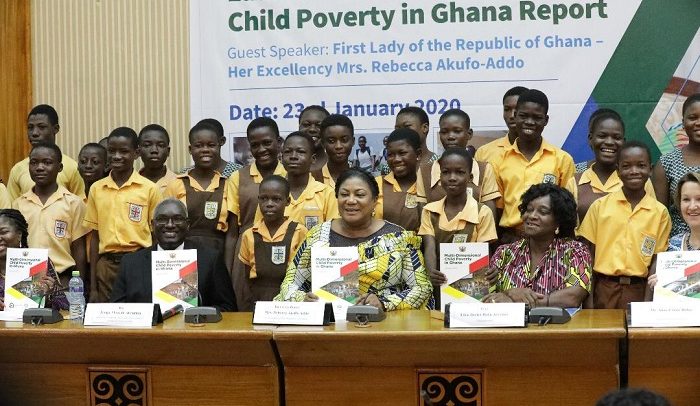First Lady Mrs. Akufo-Addo with the report in a group photo with children at the event.
First Lady Rebecca Akufo-Addo has stressed the need for a multi-sectoral response in addressing the issue of child poverty in the country.
According to the First Lady, who is passionate about the welfare of children and women, child poverty has not received enough policy attention at national conversations on poverty and inequalities.
“If we have to lay the foundation for developing skilled, productive and responsible citizens for the future of our country, we need to be unapologetically passionate and committed to child welfare.
Every child deserves to have access to good nurturing, health, child protection, education, water, sanitation and general well-being. These are all critical building blocks for child development, without which we cannot derive the expected dividend in our human development,” she said.
Mrs. Akufo-Addo, who was speaking at the launch of the Multi-Dimensional Child Poverty Report in Accra, indicated that business as usual would not get the country to its future that it wants, adding that special interventions should be directed at struggling families beyond what is available now.
“Our policies must help give children and young people the best possible start to their lives and help them to develop and become productive adults.
We must identify and implement interventions that will alleviate and contribute to the eventual eradication of child poverty, break the cycle of inter-generational deprivation, and develop the capacity of children to make successful transitions through to adulthood,” she added.
While the First Lady highlighted the importance of recourses and pledged to advocate more funding where necessary, she said adopting a multi-sectoral action plan, effective coordination and results framework would provide the foundation “for tracking the progress of our set target of reducing child poverty by half from 73% to 37% by 2030.”
Child Poverty Report
The Multi-Dimensional Child Poverty Report reveals that nearly three out of every four children in Ghana (73.4 per cent) are deprived eight in the least three out of the eight dimensions
It provides the foundation for discussing child poverty.
Again, by focusing on the multiple dimensions of poverty, including its spatial distribution, the report provides the opportunity for more precise sector specific interventions as well as a baseline for measuring future progress.
Additionally, this report offers a fundamental shift from focusing mainly on the vulnerability and exclusion dimension of child poverty and puts the spotlight on access to services critical for total and holistic child development.
The UNICEF Representative, Ghana, Anne-Claire Dufay, explained that the report is a useful source of data and evidence for advocacy and policymaking as well as serve as a reference for many sectors to become better informed of the multiple facets of child poverty.
She also reiterated the earlier call for a multi-sectoral response where all sectors of society impacting on the lives of children can strengthen linkages and systems and have a transformative impact on the lives of the most vulnerable.
By Jamila Akweley Okertchiri


